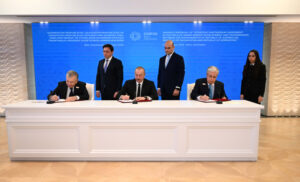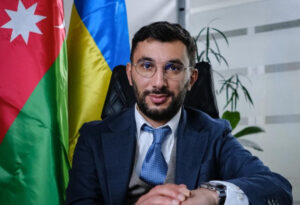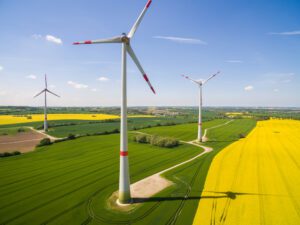
On July 4, the President of the Republic of Uzbekistan took part in the 17th summit of the Economic Cooperation Organization (ECO), which was held in Khankendi under the chairmanship of the President of Azerbaijan.
The summit was attended by heads of state and government of SCO member states, including Iran, Kyrgyzstan, Tajikistan, Turkey, Pakistan, Kazakhstan, Turkmenistan, as well as representatives of Afghanistan, international organizations, and business circles of the region.
The participants discussed prospects for deepening multilateral cooperation and exchanged views on key issues on the international and regional agenda.
At the beginning of his speech, President Shavkat Mirziyoyev outlined the current challenges to security and sustainable development, reaffirmed his commitment to the peaceful settlement of conflicts, and stressed the importance of a just settlement of the Palestinian-Israeli issue. Among the new initiatives put forward are:
• Adoption of the concept of “Strategic Goals of Economic Partnership – 2035,” which focuses on digitalization, innovation, and artificial intelligence.
• Holding a meeting of trade ministers on ECO issues in Tashkent to discuss strategic issues and prepare an agreement on trade facilitation.
• Creation of a system of “green corridors” for the rapid exchange of information and unhindered trade in agricultural products.
• Development of a long-term Ecoinvest program to stimulate private and international investment in sustainable projects in the region.
• Forming alternative transport corridors, in particular, developing the China-Kyrgyzstan-Uzbekistan railway with further connection to the Trans-Afghan Corridor.
• Accelerating the creation of a Digital Transport and Customs Office to coordinate the digitalization of logistics.
• Holding an ECO national airline forum in Samarkand to stimulate air transport, tourism, and marketing cooperation in the aviation sector.
• Developing a roadmap for expanding tourism services aimed at doubling tourist flows within the ECO.
• Creation of a cross-border “green program” for the restoration of ecosystems in desert areas with an emphasis on afforestation and the development of recreation.
• Preparation of proposals for reforming the EAEU to enhance its effectiveness and authority in the international arena.
In conclusion, the President of Uzbekistan expressed his confidence that the summit would give new impetus to economic cooperation and open a stage of meaningful transformation of regional partnership.
Full text of the speech by the President of Uzbekistan

The OKKO Group, which includes the operator of the eponymous network of gas filling stations, Concern Galnaftogaz, plans to have approximately 600 MW of wind power capacity over the next five years, 200 MW in solar energy, and 150 MW in energy storage facilities (ESF), according to Vasyl Danylyak, CEO of OKKO GROUP and co-founder of GORO Mountain Resort.
“In the energy sector, we see ourselves in about five years with approximately 600 MW in wind, 200 MW in solar, and about 150 MW in batteries. We have already accomplished some of these goals,” he said during a Forbes Ukraine Business Breakfast broadcast on his YouTube channel on Thursday.
He also added that in the agricultural sector, which is a very interesting business, the group sees its KPI (key performance indicator) as increasing efficiency per hectare.
At the same time, he denied the possible exit of the group’s fuel business to public capital markets, but suggested that this could be done to some extent for other areas of activity.
“We thought about the public capital market for our core business, retail. This is not possible now because the fuel business has become unfashionable and toxic for capital markets, banks, and MFIs. But if we are talking about other businesses, then most likely it will not be classic public capital markets, but perhaps specialized large funds operating in certain areas. This is more realistic,” said the CEO of OKKO.
As reported, the OKKO Group is building the 147 MW Ivanychi wind farm in the Volyn region with a total cost of EUR 225 million (excluding VAT) and is seeking financing for its second wind energy project in this region, the 192 MW Zatyrintsy wind farm, which is estimated at EUR 250 million (excluding VAT).
The group also won a five-year special auction held by NEC Ukrenergo for the provision of power system balancing services, at which it announced the installation of a 20 MW energy storage facility (ESF).
In addition, the group plans to open a new 60,000-tonne elevator by autumn 2025 and a bioethanol plant in summer 2026. An important component of OKKO’s agricultural portfolio is its partnership with Gadz-Agro in the Ternopil region, in which the company acquired a stake in 2023. The enterprise cultivates 26,000 hectares of land and has about 10,000 head of cattle, including 5,000 dairy cows. It is also one of the largest horticultural farms in Ukraine, but OKKO decided not to integrate the horticulture business into its operations.
OKKO Group unites more than 10 diverse businesses in the fields of manufacturing, trade, construction, insurance, services, and other services. The flagship company of the group is Galnaftogaz, which operates one of the largest gas station chains in Ukraine under the OKKO brand, with almost 400 gas stations.
The founder and ultimate beneficiary of the group is Vitaliy Antonov.

On November 13, as part of the COP29 summit, a ceremony was held to sign the Agreement on Strategic Partnership in the Development and Transmission of Green Energy between Uzbekistan, Kazakhstan and Azerbaijan.
In his speech at the event, President of the Republic of Uzbekistan Shavkat Mirziyoyev emphasized that renewable energy is not an economic goal, but a contribution to the future, the result of a sense of responsibility to future generations.
The environmental importance of the project was particularly emphasized. The energy to be transmitted is wind and solar energy, a renewable and clean resource that will reduce the impact on the climate.
Thus, the parties support joint efforts to protect the climate under the Paris Agreement and the Sustainable Development Goals.
It was noted that the signatory countries, having significant renewable energy resources, can make a significant contribution to the global energy transition.
Touching upon the efforts of Uzbekistan to develop a green economy, the Leader of Uzbekistan focused on the key aspects of large-scale work in this direction.
It was noted that about two gigawatts of solar and wind generation capacity is being commissioned annually in the country. In addition, an additional 2.6 gigawatts of renewable generation and 300 megawatts of energy storage systems will be connected to the grid by the end of this year.
By 2030, it is planned to increase the share of renewable energy sources to 40 percent, as well as to create 4.2 gigawatts of energy storage systems.
It was expressed that the economic effect of this project will be felt by all its participants.
The importance of accelerating the project implementation, including the establishment of a joint venture, development and approval of technical documentation and other procedures, was emphasized.
In conclusion, President Mirziyoyev reaffirmed Uzbekistan’s commitment to the joint implementation of this regional project.

During the Week of International Cooperation Initiatives, which took place on October 17-25 in Tashkent, Anthony Bringazen, Vice President for Central Asia of the Saudi company ACWA Power, said that the company is implementing large-scale projects in Uzbekistan worth about $15 billion.
This fund has been allocated for 15 projects. Most of the projects are related to wind energy. In particular, 87% of the investment will be directed to green energy projects, and the rest to the production of green hydrogen. All 15 projects are planned to be commissioned by 2030.
Anthony Bringaisen noted that after Saudi Arabia, Uzbekistan accounts for the largest volume of the company’s investments.
It is noted that the $1.1 billion TPP project in the Syr Darya will provide electricity to more than 3 million households and hundreds of industrial enterprises. The first phase of the green hydrogen project will produce 3 thousand tons of hydrogen. Next, the focus will be on mineral fertilizer processing and the construction of a 52 megawatt wind farm.

COP29 plays a key role in the development of green energy in Azerbaijan. This event will provide our country with a unique opportunity to demonstrate its responsible attitude to the use of natural resources by developing green energy.
Jalal Huseynov, chairman of the Ukrainian-Azerbaijani business association Terezi, told AZERTAD.
According to him, Azerbaijan will be able to show its commitment to sustainable development and investment in environmentally friendly technologies.
“This not only reduces dependence on traditional energy sources, but also helps attract international investment, exchange of experience and strengthen cooperation in the field of climate policy. Thus, holding COP29 will be an important step towards a sustainable and environmentally friendly future for Azerbaijan,” J.Huseynov emphasized.
He noted that our country is actively working on the development of alternative energy: “We have recently signed an agreement on an energy cable from Azerbaijan to the EU, which will allow Eastern European countries, including Ukraine, to connect to this system. This agreement opens up new opportunities for cooperation in the field of green energy.
Azerbaijan’s investments in green energy projects have great potential, especially in the context of the destruction of Ukraine’s energy infrastructure as a result of Russian aggression and the shortage of electricity generation during the war. These investments will help not only restore but also modernize Ukraine’s energy system, making it more sustainable and environmentally friendly.”
Jalal Huseynov said that Azerbaijan could also become a transit country for gas from Central Asia through Ukraine: “This was recently announced by the President of Ukraine Volodymyr Zelenskyy. Azerbaijan’s participation and experience in the development of new gas fields in Ukraine is also being considered, which indicates deep and promising economic ties between our countries.”

Germany has confirmed its intention to provide financial assistance for green energy initiatives in Ukraine, President of Ukraine Volodymyr Zelensky has said.
“The German Chancellor confirmed Germany’s intention to fill with specifics and financial assistance initiatives for green transformation, decarbonization and development of renewable energy in Ukraine. Our state is ready to offer great prospects for mutually beneficial cooperation in the field of green energy,” he said at a joint briefing with German Chancellor Olaf Scholz in Kyiv on Monday.